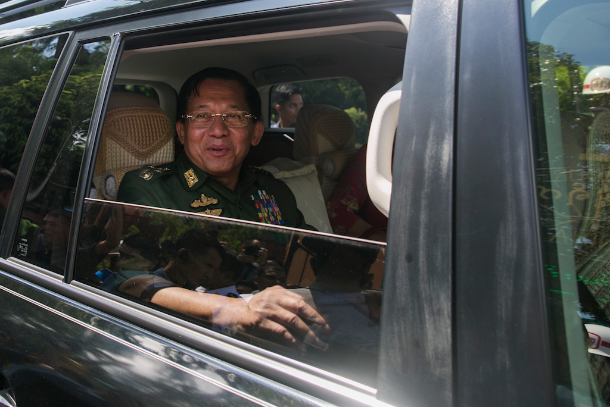
ucanews.com reporter, Yangon October 1, 2019
While pressure mounts on Myanmar’s military over atrocities suffered by the Rohingya, a rare scenario is unfolding inside the country as the military chief pays visits to Muslim mosques and other non-Buddhist places.
In late August, Gen. Min Aung Hlaing, commander-in-chief of the Myanmar military, and his deputies visited a mosque and a Catholic church in Pyinmana town, close to Naypyitaw, the capital city.
Two weeks later, the military chief visited a mosque and a Catholic church in Mandalay. On Sept. 17, he visited the Muslim Free Hospital, a Catholic-run home for the aged, a Muslim shrine and a Hindu temple.
During his visits to non-Buddhist places, he handed over donations of rice, oil, salt and cash that were given by families of army, navy and air force personnel.
The charm offensive has come after Min Aung Hlaing and his forces were widely accused of committing crimes against humanity in a crackdown on Rohingya Muslims that led many to flee to Bangladesh two years ago.
A United Nations Fact Finding Mission has released its final reports on abuses committed throughout Myanmar, the military’s business links and its widespread sexual violence in ethnic areas.
U.N. investigators have called for prosecution of military leaders including Min Aung Hlaing at the International Criminal Court (ICC) over atrocities committed against the Rohingya and other ethnic minorities.
During his visit to Mandalay, the military chief said that as all Myanmar citizens live on the same land, drink water from the same source and live under the same roof, all have a duty to work for the benefit of the country.
Call for concrete action
Al Haj Aye Lwin, chief convener of the Yangon-based Islamic Center, is optimistic over the military chief’s rare visits to mosques, churches and temples as “it is one step in the right direction.”
“There might be some factors behind the visit but it is for the good of the country and shows that not only Buddhists but also other religions are living in Myanmar,” he told ucanews.com.
Critics say the goodwill show is intended to counter international allegations of the military’s persecution of ethnic minorities.
Phil Robertson, deputy Asia head at Human Rights Watch, said Myanmar is quite clearly under pressure from the international community over its treatment of Muslim Rohingya and Christian Kachin and this is probably playing a role in these developments.
“But the question of why Min Aung Hlaing is undertaking these visits now is less interesting than the question of whether this Tatmadaw charm offensive toward minority religions will be sustained and carried over into policy-making actions,” Robertson told ucanews.com.
He said the only things the houses of worship visited by Min Aung Hlaing have received are one-off donations and photos with the general to display on walls.
The military chief’s visits should be followed up with concrete action to end the arbitrary government restrictions making it nearly impossible for Muslims, Christians and other minority religions to establish new houses of worship or make repairs to existing ones, Robertson said.
No behavioral change
Ashin Ariya Wun Tha Bhiwun Sa, a Mandalay-based monk involved in interfaith activities, said Min Aung Hlaing appears to be nervous about what to do amid international pressure for him to face an ICC trial.
The monk sees the chief’s actions as intended to counter allegations by the international community that there is no religious freedom in Myanmar and the military is oppressing ethnic groups.
“Visiting mosques, churches and temples is a proper act but interfaith leaders will not be convinced by one-time visits,” said the monk, who is facing a defamation lawsuit by the military.
Thet Swe Win, an interfaith activist and director of the Center for Youth and Social Harmony, cannot see any behavioral change in Myanmar’s military and believes it is a political game.
“It is not enough to make visits — action must follow as the Tatmadaw is persecuting minority religions such as Muslims and Christians,” Thet Swe Win told ucanews.com.
Khin Zaw Win, director of Yangon-based think tank Tampadipa Institute, is optimistic that the move will bring a good outcome.
“I acknowledge the ICC process is ongoing and we can’t ignore it, but in the long term it is a positive move and good for the future of the country,” he said.
Diminished role of Buddhist group
While the military chief’s visits to non-Buddhist places have provoked mixed reactions inside Myanmar, hard-line nationalists have been silent.
Ma Ba Tha, which has often used divisive rhetoric against Muslims in the Buddhist-majority country, has had much support from the military and the military-linked Union Solidarity and Development Party.
In June, a senior military officer from Yangon donated 30 million kyats (US$19,700) to Ma Ba Tha.
In pro-military rallies held in Yangon and other places early this year, nationalists held photos of Min Aung Hlaing as they rallied against changing the military-drafted constitution.
Critics question the role of nationalists in the future as the military top brass appear to have shifted course to religious tolerance.
Thet Swe Win said the move largely affects the role of nationalists who look to the military as a supporter of their activities. “We can say that the nationalists’ role is diminishing,” he said.
Ultranationalist monk U Wirathu and Hla Swe — another nationalist who is a former military general — are on wanted lists after courts issued warrants for their arrest on charges including sedition and hate speech.
